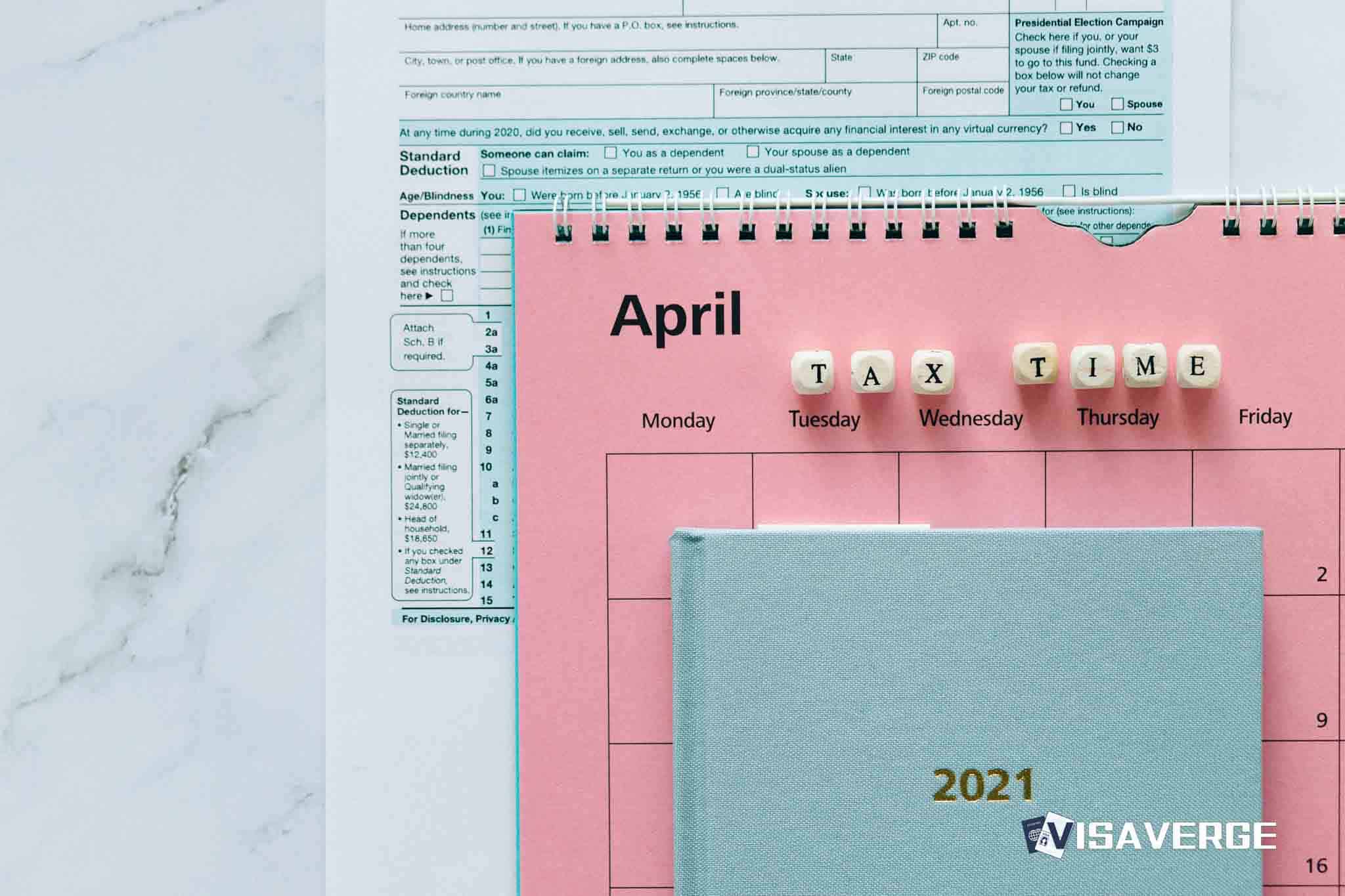Key Takeaways
• IRS requires a valid TIN for all tax filers, spouses, and dependents by tax return due date.
• SSN is for citizens/work-authorized; ITIN is for non-eligible individuals; ATIN is for adopted children.
• Tax credits like Earned Income Credit require valid SSNs; ITINs cannot claim EIC benefits.
Understanding Taxpayer Identification Numbers for Immigrants and Non-Citizens in the United States 🇺🇸
When living, working, or studying in the United States 🇺🇸, understanding the rules around tax filing is important for everyone, including immigrants and non-citizens. One of the most important parts of filing taxes is having the right Taxpayer Identification Number (TIN). This number is needed for you, your spouse (if you file together), and any dependents you claim on your tax return. The TIN helps the Internal Revenue Service (IRS) keep track of tax records and make sure everyone pays the correct amount of tax.

This guide explains what a Taxpayer Identification Number is, who needs one, the different types available, and how they connect to tax credits like the Earned Income Credit. We’ll also look at how to apply for a TIN, what happens if you don’t have one, and what rights and limits come with each type. Real-life examples and practical tips are included to help you understand how these rules affect you and your family.
What Is a Taxpayer Identification Number (TIN)?
A Taxpayer Identification Number is a unique number the IRS uses to identify people for tax purposes. You must have a valid TIN by the due date of your tax return (including any extensions) if you want to file taxes, claim dependents, or get certain tax credits.
There are three main types of TINs:
- Social Security Number (SSN): Given to U.S. citizens, permanent residents, and some temporary workers.
- Individual Taxpayer Identification Number (ITIN): Given to people who are not eligible for an SSN but need to file taxes.
- Adoption Taxpayer Identification Number (ATIN): Given to children being adopted who do not yet have an SSN.
Each type of TIN serves a specific group of people. The most common is the SSN, but many immigrants and non-citizens use an ITIN.
Why Is a TIN Needed for Tax Returns?
The IRS requires a TIN for every person listed on a tax return. This includes:
- The taxpayer (the person filing the return)
- The spouse (if filing jointly)
- All dependents (children or other family members you claim)
Without a valid TIN, you cannot file a complete tax return or claim certain tax credits. For example, if you want to claim the Earned Income Credit, Child Tax Credit, or Additional Child Tax Credit, you must have a valid SSN for everyone involved. If you want to claim the Credit for Other Dependents or the American Opportunity Tax Credit, you can use an SSN, ITIN, or ATIN.
If you do not have a TIN for a dependent by the due date of your return (including extensions), you cannot claim certain credits for that dependent—even if you get a TIN later. This rule makes it important to get the right TIN before you file your taxes.
Types of Taxpayer Identification Numbers
Let’s look at each type of TIN in more detail.
Social Security Number (SSN)
An SSN is the most common TIN. It is given to:
- U.S. citizens
- Permanent residents (green card holders)
- Some temporary workers with permission to work in the United States 🇺🇸
Most people who live and work in the United States 🇺🇸 have an SSN. You need an SSN to work legally, get Social Security benefits, and qualify for most tax credits.
Individual Taxpayer Identification Number (ITIN)
An ITIN is for people who are not eligible for an SSN but still need to file a U.S. tax return. This includes:
- Nonresident aliens who must file a U.S. tax return
- Nonresident aliens claiming a reduced withholding rate under a tax treaty
- U.S. resident aliens under the “substantial presence test” (people who have been in the United States 🇺🇸 long enough to be considered residents for tax purposes)
- Dependents or spouses of the above groups
- Dependents or spouses of nonresident alien visa holders
ITINs are for federal tax reporting only. They do not give you permission to work in the United States 🇺🇸 or make you eligible for Social Security benefits. If you have an ITIN, you can file taxes, but you cannot use it to work or get most government benefits.
Adoption Taxpayer Identification Number (ATIN)
An ATIN is used for children being adopted who do not yet have an SSN. This temporary number lets adoptive parents claim the child as a dependent on their tax return until the child gets an SSN.
Eligibility and Requirements for Each TIN
Who Needs a TIN?
You need a TIN if you:
- File a U.S. tax return (Form 1040 or similar)
- Are claimed as a dependent on someone else’s tax return
- Want to claim certain tax credits
Everyone listed on the tax return must have a valid TIN by the due date of the return (including extensions).
When Is an SSN Required?
You must use an SSN if you are eligible for one. If you are a U.S. citizen, permanent resident, or have a visa that allows you to work, you should apply for an SSN. You cannot get an ITIN if you are eligible for an SSN.
When Is an ITIN Used?
You use an ITIN if you are not eligible for an SSN but still need to file a tax return. For example:
- Maria is a nonresident alien student in the United States 🇺🇸. She does not have an SSN but needs to file a tax return because she earned money from a scholarship. She applies for an ITIN.
- Ahmed is the spouse of a nonresident alien working in the United States 🇺🇸. He does not have an SSN, so he uses an ITIN to be included on the tax return.
When Is an ATIN Used?
You use an ATIN only if you are adopting a child who does not yet have an SSN. This lets you claim the child as a dependent until the SSN is issued.
How to Apply for an ITIN
If you need an ITIN, you must file Form W-7, Application for IRS Individual Taxpayer Identification Number. You usually send this form with your federal tax return. You must also include original proof of identity or copies certified by the issuing agency, along with documents showing your foreign status.
You can find the official Form W-7 and instructions on the IRS website.
You can also apply for an ITIN through an IRS-authorized Acceptance Agent, who can help you with the paperwork and check your documents.
Important: If you have applied for an SSN and are waiting for a decision, do not file Form W-7. Only apply for an ITIN if the Social Security Administration tells you that you cannot get an SSN. In that case, include proof of the SSN denial with your Form W-7.
Special Rules for ITINs
- You cannot e-file (electronically file) a tax return using an ITIN in the same year the ITIN is assigned. You must wait until the next year to e-file using that ITIN.
- ITINs expire if not used on a federal tax return for three years in a row. If your ITIN expires, you must renew it before using it on a new tax return.
- You only need to renew your ITIN if you plan to use it on a tax return and it has expired or is about to expire.
Rights and Limits of Each TIN
What Can You Do With an SSN?
- Work legally in the United States 🇺🇸
- Qualify for Social Security benefits
- File taxes and claim all tax credits, including the Earned Income Credit
What Can You Do With an ITIN?
- File federal tax returns
- Meet tax reporting requirements
- Be claimed as a dependent or spouse on someone else’s tax return
Limits of an ITIN:
- You cannot use it to work in the United States 🇺🇸
- You cannot get Social Security benefits
- You cannot claim the Earned Income Credit (EIC)
- A child with an ITIN cannot be claimed as a qualifying child for the EIC
What Can You Do With an ATIN?
- Temporarily claim an adopted child as a dependent on your tax return
Tax Credits and TIN Requirements
Some tax credits have strict rules about which TINs are accepted. Here’s how it works:
Earned Income Credit (EIC)
- Requires a valid SSN for everyone on the return.
- If a qualifying child does not have a valid SSN, you may only claim the EIC for yourself (self-only EIC), not for the child.
- If you or your child only have an ITIN or ATIN, you cannot claim the EIC for that child.
Child Tax Credit (CTC) and Additional Child Tax Credit (ACTC)
- Requires a valid SSN for the child.
- If the child does not have an SSN by the due date of the return, you cannot claim these credits for that child—even if you get an SSN later.
Credit for Other Dependents and American Opportunity Tax Credit
- Accepts a valid SSN, ITIN, or ATIN.
- The child or dependent must have the TIN by the due date of the return.
Special Case: Child Born and Died in the Same Year
If a child is born and dies in the same year and does not have an SSN, you can still claim the child as a dependent. Enter “Died” in the SSN box on Form 1040 and attach a copy of the birth certificate, death certificate, or hospital records showing the child was born alive. You may claim the EIC, CTC, and ACTC using this method.
Real-World Example: Filing Taxes as an Immigrant Family
Let’s look at a common situation:
Ana and her husband moved to the United States 🇺🇸 on work visas. Ana has an SSN, but her husband and their two children do not. Ana files her tax return and wants to claim her husband and children as dependents.
- Her husband and children are not eligible for SSNs, so they apply for ITINs using Form W-7.
- Ana files her tax return with the ITIN applications attached.
- Because her children only have ITINs, Ana cannot claim the Child Tax Credit or Earned Income Credit for them. She can, however, claim the Credit for Other Dependents.
This example shows why it’s important to know which TIN is needed for each credit and to apply for the right number before filing your tax return.
Practical Tips and Next Steps
- Apply for the correct TIN as soon as possible. It can take several weeks to get an ITIN, so start early.
- Check which tax credits you want to claim and make sure everyone listed has the right TIN.
- Renew your ITIN if it has expired and you plan to use it on a tax return.
- Keep all documents safe, including your TIN letter, tax returns, and proof of identity.
- If you are adopting a child, apply for an ATIN if the child does not have an SSN yet.
For more information on TINs and tax filing, visit the IRS official Taxpayer Identification Numbers page.
Conclusion
Having the right Taxpayer Identification Number is a key part of filing taxes in the United States 🇺🇸, especially for immigrants and non-citizens. The type of TIN you need—SSN, ITIN, or ATIN—depends on your immigration status and your reason for filing taxes. Each TIN comes with its own rules about what you can and cannot do, especially when it comes to tax credits like the Earned Income Credit.
Remember:
– Get the correct TIN before filing your tax return.
– Know which credits require an SSN and which accept an ITIN or ATIN.
– Renew your ITIN if needed.
– Keep all your tax documents safe.
As reported by VisaVerge.com, understanding these rules helps immigrants and their families avoid problems with the IRS and make the most of the tax benefits they qualify for. If you have questions, check the official IRS links or talk to a tax professional who understands immigration and tax law. This way, you can meet your tax obligations and protect your family’s financial future in the United States 🇺🇸.
Learn Today
Taxpayer Identification Number (TIN) → A unique IRS number used to identify taxpayers for filing and tax benefits.
Social Security Number (SSN) → A TIN given to U.S. citizens, permanent residents, and eligible workers for taxes and benefits.
Individual Taxpayer Identification Number (ITIN) → A TIN for non-eligible SSN filers to report taxes without work or benefit eligibility.
Adoption Taxpayer Identification Number (ATIN) → Temporary TIN for adopting parents to claim children without an SSN as dependents.
Earned Income Credit (EIC) → A tax credit requiring valid SSNs for eligibility, unavailable to ITIN holders on dependents.
This Article in a Nutshell
For immigrants and non-citizens, obtaining the correct Taxpayer Identification Number is crucial to file taxes and claim credits properly in the U.S. SSNs, ITINs, and ATINs serve different groups with specific tax benefits and restrictions. Understanding TIN types avoids IRS issues and secures proper tax credit claims.
— By VisaVerge.com













